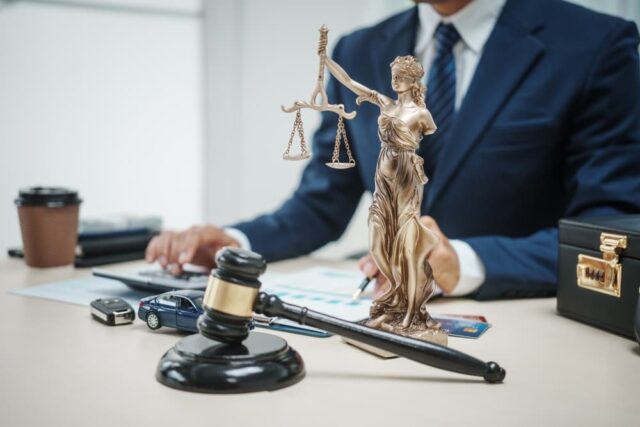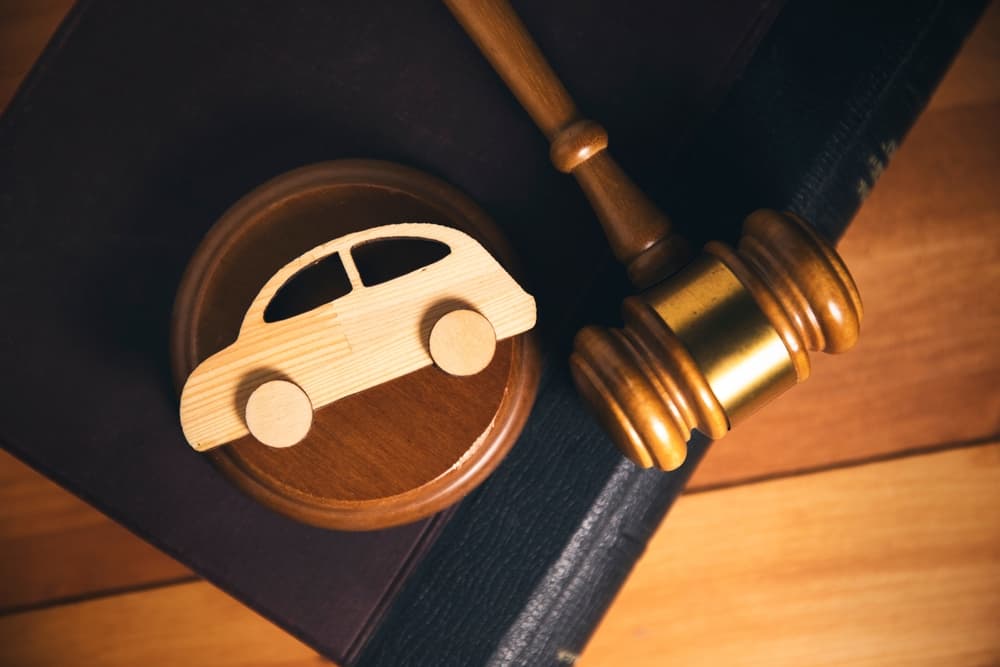Car accidents can be traumatic and devastating events, often causing physical injuries, emotional distress, and financial burdens. As such, when involved in a car accident, you may find yourself in a situation where you need to file a lawsuit to seek compensation for your losses.
In a car accident lawsuit, the injured party typically files a claim directly against the responsible party’s insurance company or the at-fault driver. The lawsuit involves gathering evidence, negotiating with insurance companies, and presenting the case in court if a settlement cannot be reached. You will want to consult a skilled car accident attorney who can guide you through the complex legal process and help protect your rights. Contact a car accident lawyer near you to discuss your case and explore your options for pursuing a car accident lawsuit.
Table Of Content
- When Is a Car Accident Lawsuit Necessary?
- Preparing for a Car Accident Lawsuit
- Settlement Negotiations
- Proceeding to Trial
- Compensation and Enforcement
- Will My Car Accident Case Settle?
- The Role of a Car Accident Lawyer
- Injured in a Car Accident? Contact a Seasoned Car Accident Attorney for Help Today
When Is a Car Accident Lawsuit Necessary?
Car accidents can result in a variety of legal and financial complications. In some cases, filing a lawsuit may be necessary to ensure you receive fair compensation for your injuries and losses. Here are some situations where a car accident lawsuit might be needed:
Disputes Over Fault
Determining who is at fault in a car accident can be complicated, especially when conflicting accounts of the events leading up to the accident exist. If there is a dispute over fault, a lawsuit may be necessary to resolve the issue and determine liability.
Denied or Insufficient Insurance Claims
Sometimes, insurance companies deny or undervalue your claim, leaving you with insufficient compensation for your injuries and losses. In such cases, pursuing a car accident lawsuit can help you seek the fair compensation you deserve.
Severe Injuries with Significant Medical Costs
If you have sustained severe injuries in a car accident, you may be facing substantial medical expenses. A car accident lawsuit can help you recover these costs, including hospital bills, surgeries, rehabilitation, and ongoing medical treatment.
Loss of Income Due to Long-Term or Permanent Disabilities
Car accidents can result in long-term or permanent disabilities that prevent you from returning to work or earning a living. In these cases, a lawsuit can help pursue compensation for lost earnings and reduced earning capacity.
Emotional and Psychological Suffering
Car accidents can have a significant impact on your mental and emotional well-being. If you have experienced emotional distress, anxiety, depression, or other psychological suffering as a result of the accident, a lawsuit can help seek damages for these non-economic losses.
Those injured in car accidents should understand the difference between negotiating a settlement and filing a lawsuit. While many car accident cases are resolved through settlement negotiations, a lawsuit may be necessary when a fair settlement cannot be reached or when there are disputes that need to be resolved in court. Consulting with a car accident lawyer can help determine your situation’s best action.
Preparing for a Car Accident Lawsuit
Preparing for a car accident lawsuit requires careful planning and gathering of evidence. Here are vital steps to take during the preparation phase:
Gathering Evidence
Collecting strong evidence is critical to building a compelling case. The following types of evidence can be instrumental in supporting your claim:
- Police reports: Obtain a copy of the official police report detailing the facts of the accident and any citations issued.
- Photographs: Take pictures of the accident scene, including the vehicles involved, property damage, skid marks, road conditions, and any visible injuries.
- Medical records and bills: Gather medical records detailing your injuries, treatment plans, and expenses related to your medical care.
- Witness statements: Obtain statements from any witnesses to the accident who can provide valuable testimony.
- Surveillance footage: If available, obtain any surveillance footage that may have captured the accident or relevant events leading up to it.
Hiring a Car Accident Lawyer
 Hiring a car accident lawyer who is well-versed in personal injury cases is best. A skilled attorney can provide experienced legal advice and manage the many challenges of the legal process on your behalf. Some key roles of a car accident lawyer include:
Hiring a car accident lawyer who is well-versed in personal injury cases is best. A skilled attorney can provide experienced legal advice and manage the many challenges of the legal process on your behalf. Some key roles of a car accident lawyer include:
- Evaluating the case: Your lawyer will assess the strength of your case and determine the best course of action, whether it’s pursuing a lawsuit or negotiating a settlement.
- Initial investigation and case review: Your lawyer will conduct a thorough investigation of the accident, including reviewing insurance policies, communication records, and all available evidence.
Filing the Lawsuit
If a fair settlement cannot be reached, your lawyer may proceed to file a formal complaint in court. The complaint will outline the nature of the accident, the legal basis for the claim (such as negligence or recklessness), and the damages sought.
Serving the Defendant
Once the lawsuit has been filed, it is essential to notify the defendant formally. It is typically done by serving them with a copy of the complaint and a summons, which provides them with a specific timeline to respond to the lawsuit.
Defendant’s Response
The defendant has the opportunity to respond to the lawsuit, which can include accepting responsibility, filing a motion to dismiss, or disputing the claim. This phase can lead to further negotiations or, if necessary, proceed to trial.
The Discovery Phase
After the initial filing and response, the case enters the discovery phase. This phase involves exchanging information and evidence between the parties involved in the lawsuit.
In a car accident lawsuit, the discovery process allows both parties to gather evidence and information from each other to build their case. It aims to ensure transparency and prevent surprises during the trial.
The discovery process involves various tools to gather information and evidence. These tools include:
- Interrogatories: Written questions that must be answered under oath.
- Depositions: Oral testimony taken under oath, which may involve questioning by both parties’ attorneys.
- Requests for documents or records: These are formal requests to obtain relevant documents or records, such as medical records or maintenance logs.
- Requests for admissions: Requests for the other party to admit or deny specific facts relevant to the case.
Discovery plays a valuable role in building a solid case. It allows the plaintiff to gather evidence supporting their claim and identify weaknesses in the defense’s case. This phase can help strengthen the plaintiff’s position and increase the likelihood of a favorable outcome.
Settlement Negotiations
While many car accident cases are ultimately resolved through settlement negotiations, this process can be challenging and requires skillful negotiation. Here are essential points to understand about settlement negotiations:
Why Settlement Is Common
Settlements are common in car accident lawsuits due to several benefits they offer, including:
- Faster resolution: Settling the case avoids the lengthy court process and potential delays.
- Reduced legal costs: Settling out of court is often more cost-effective than proceeding to trial.
- Certainty of outcome: You have more control over the case’s outcome by reaching a settlement.
Role of Mediation
Mediation is often employed as a method of alternative dispute resolution in car accident cases. A neutral mediator facilitates discussions between both parties, helping them reach a mutually agreeable settlement. Mediation can provide a more amicable and efficient resolution than going to trial.
Calculating Damages
When negotiating a settlement, consider the various types of damages that may be included:
- Medical expenses (past and future): The cost of medical treatment, surgeries, rehabilitation, and ongoing care.
- Lost earnings and reduced earning capacity: Compensation for income lost due to the accident and potential future earning capacity reduction.
- Pain and suffering: Non-economic damages for physical pain, emotional distress, and life-altering impact.
- Property damage: Compensation for repair or replacement of damaged property, such as your vehicle.
The Lawyer’s Role in Negotiations
A car accident lawyer plays a critical role in settlement negotiations. They will ensure you receive fair compensation by evaluating settlement offers, advising you on whether to accept or reject them, and advocating for your best interests throughout the negotiation process.
Proceeding to Trial
The case may proceed to trial if a fair settlement cannot be reached. It is a process that requires careful preparation and presentation of evidence. Here’s what you need to know about proceeding to trial:
Preparing for Trial
Before trial, your car accident lawyer will build a compelling case by preparing witnesses, expert testimony, and evidence for presentation in court. They will formulate a strategy to present your case and counter any arguments from the defense.
Trial Structure
The trial process typically involves the following stages:
- Opening statements: Both parties present their case to the judge and jury, outlining key arguments and evidence.
- Presentation of evidence: Witnesses are called to testify, and physical evidence is presented to support each party’s claims.
- Witness testimony and cross-examination: Attorneys from both sides question witnesses to elicit information that supports their case.
- Closing arguments: Attorneys summarize their case and make a final appeal to the judge or jury.
Jury Deliberation and Verdict
After closing arguments, the judge instructs the jury regarding the applicable laws and their duty to reach a fair and impartial verdict. The jury then deliberates and decides on fault and the amount of damages to be awarded. The judge makes the final determination in a bench trial (without a jury).
Post-Trial Motions
After a verdict is reached, either party may file post-trial motions, such as appeals or motions to alter the judgment, to challenge the court’s decision.
Compensation and Enforcement
If you are successful in your car accident lawsuit, you may be entitled to compensation for various damages. Understanding the different types of damages and how they are enforced is vital after a car accident. Here’s what you need to know:
Types of Damages
 Economic Damages: This includes medical bills, lost earnings, property damage, and any other quantifiable financial losses resulting from the accident.
Economic Damages: This includes medical bills, lost earnings, property damage, and any other quantifiable financial losses resulting from the accident.- Non-Economic Damages: These damages compensate for pain and suffering, emotional distress, loss of enjoyment of life, and other intangible losses.
- Punitive Damages: In cases of gross negligence or recklessness, punitive damages may be awarded to punish the at-fault party and deter similar behavior in the future.
Collecting the Award
Once a verdict or settlement has been reached, the responsible party is typically required to pay the awarded compensation. However, in some cases, the defendant may refuse to comply. In such situations, your car accident lawyer can assist in enforcing the judgment through legal means, such as garnishing earnings or placing liens on the defendant’s assets.
Will My Car Accident Case Settle?
Many car accident cases settle before reaching trial, as both parties often prefer to avoid the time, cost, and uncertainty of court proceedings. Settlement negotiations typically occur after evidence is exchanged and both sides assess the strength of the case. Factors influencing settlement include the clarity of liability, the severity of injuries, and the willingness of insurance companies to offer fair compensation. While settlements are common, some cases proceed to trial if disputes over fault or damages remain unresolved. Consulting an experienced car accident lawyer ensures you have strong representation during negotiations and increases the likelihood of a favorable settlement.
The Role of a Car Accident Lawyer
A car accident lawyer plays a critical role throughout the entire process of a car accident lawsuit. Here’s what you can expect from your attorney:
Guidance Through Every Stage
A car accident lawyer provides professional guidance and representation, from investigating the case and gathering evidence to negotiating with insurance companies and opposing counsel.
Protecting Victims’ Rights
A skilled attorney prevents insurance companies from taking advantage of victims and ensures that all legal deadlines, such as the statute of limitations, are met.
Maximizing Compensation
Your car accident attorney will employ strategies to recover the full amount of damages owed to you, protecting your interests and securing fair compensation.
Injured in a Car Accident? Contact a Seasoned Car Accident Attorney for Help Today
Car accident lawsuits can be detailed and challenging. Be sure to seek professional legal assistance as you face the legal process and attempt to secure fair compensation for your losses. Contact a personal injury lawyer near you today for a free consultation to discuss your case and explore your options for pursuing a car accident lawsuit.

